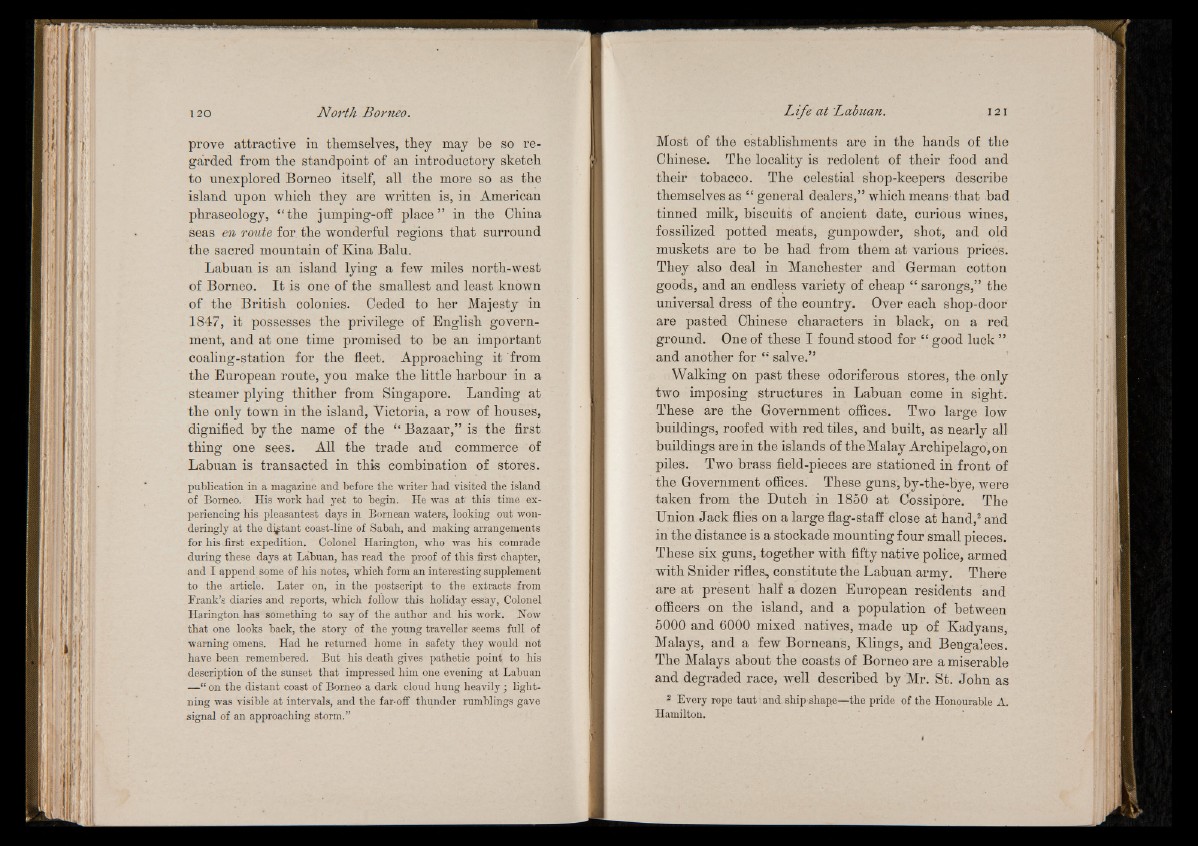
prove attractive in themselves, they may be so regarded
from the standpoint of an introductory sketch
to unexplored Borneo itself, all the more so as the
island upon which they are written is, in American
phraseology, “ the jumping-off place” in the China
seas en route for the wonderful regions that surround
the sacred mountain of Kina Balu.
Labuan is an island lying a few miles north-west
of Borneo. I t is one of the smallest and least known
of the British colonies. Ceded to her Majesty in
1847, it possesses the privilege of English government,
and at one time promised to be an important
coaling-station for the fleet. Approaching it from
the European route, you make the little harbour in a
steamer plying thither from Singapore. Landing at
the only town in the island, Victoria, a row of houses,
dignified by the name of the “ Bazaar,” is the first
thing one sees. All the trade and commerce of
Labuan is transacted in this combination of stores.
publication in a magazine and before the writer bad visited the island
of Borneo. His work bad yet to begin. He was a t tbis time experiencing
bis pleasantest days in Bornean waters, looking out won-
deringly at the distant coast-line of Sabah, and making arrangements
for his first expedition. Colonel Harington, who was his comrade
during these days at Labuan, has read the proof of this first chapter,
and I append some of his notes, which form an interesting supplement
to the article. Later on, in the postscript to the extracts from
Frank’s diaries and reports, which follow this holiday essay, Colonel
Harington has something to say of the author and his work. How
that one looks back, the story of the young traveller seems full of
warning omens. Had he returned home in safety they would not
have been remembered. But his death gives pathetic point to his
description of the sunset that impressed him one evening at Labuan
—“ on the distant coast of Borneo a dark cloud hung heavily; lightning
was visible at intervals, and the far-off thimder rumblings gave
signal of an approaching storm.”
Most of the establishments are in the hands of the
Chinese. The locality is redolent of their food and
their tobacco. The celestial shop-keepers describe
themselves as “ general dealers,” which means- that bad
tinned milk, biscuits of ancient date, curious wines,
fossilized potted meats, gunpowder, shot, and old
muskets are to be had from them at various prices.
They also deal in Manchester and German cotton
goods, and an endless variety of cheap “ sarongs,” the
universal dress of the country. Over each shop-door
are pasted Chinese characters in black, on a red
ground. One of these I found stood for “ good luck ”
and another for “ salve.”
Walking on past these odoriferous stores, the only
two imposing structures in Labuan come in sight.
These are the Government offices. Two large low
buildings, roofed with red tiles, and built, as nearly all
buildings are in the islands of the Malay Archipelago, on
piles. Two brass field-pieces are stationed in front of
the Government offices. These guns, by-the-bye, were
taken from the Dutch in 1850 at Cossipore. The
Union Jack flies on a large flag-staff close at hand,2 and
in the distance is a stockade mounting four small pieces.
These six guns, together with fifty native police, armed
with Snider rifles, constitute the Labuan army. There
are at present half a dozen European residents and
officers on the island, and a population of between
5000 and 6000 mixed natives, made up of Kadyans,
Malays, and a few Borneans, Klings, and Bengalees.
The Malays about the coasts of Borneo are a miserable
and degraded race, well described by Mr. St. John as
2 Every rope taut and. ship shape—the pride of the Honourable A.
Hamilton.